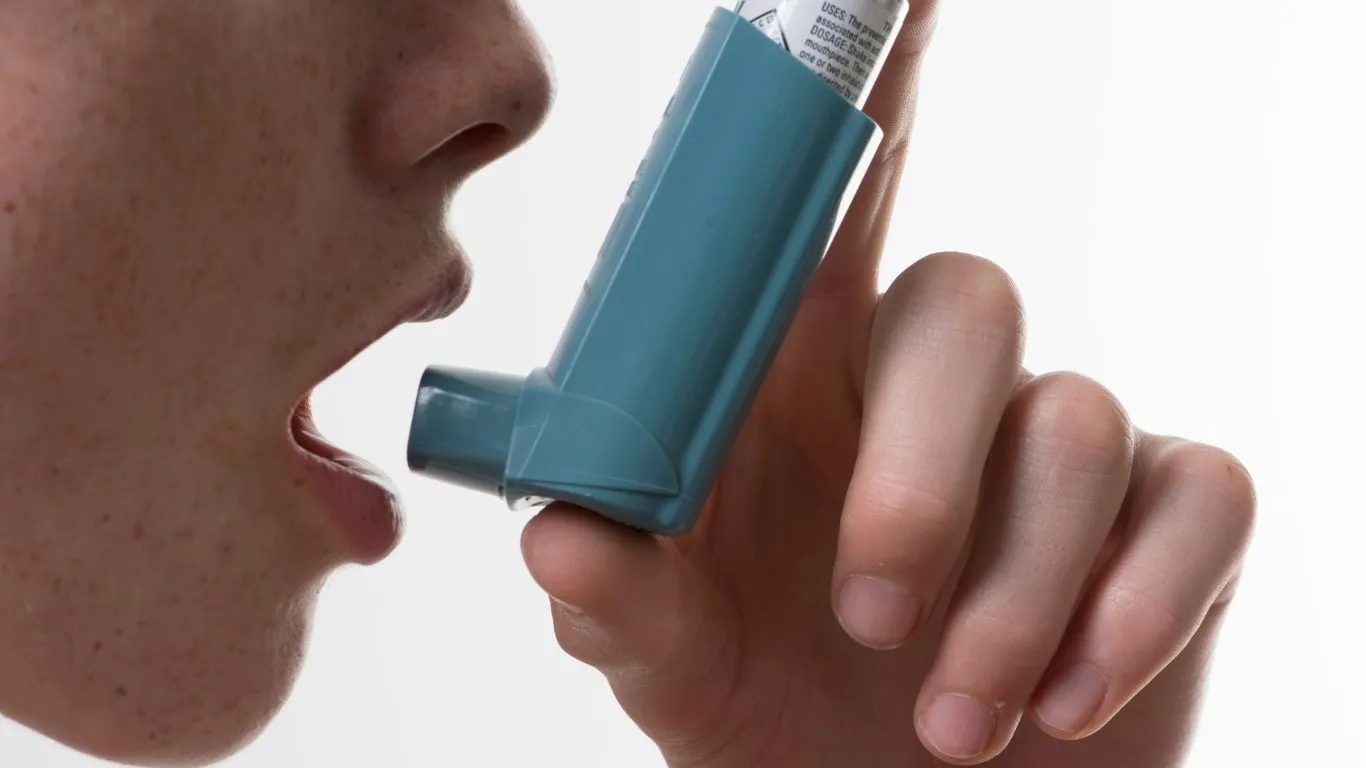Asthma Steroids & Weight Gain: The Hidden Side Effect!
Can asthma cause weight gain from steroids? Oh, absolutely—this is a question I get asked all the time in my clinic. And I get it. You start on steroids to help your breathing, finally feel like you can take a deep breath again, and then bam—your jeans don’t fit, your energy feels off, and you’re wondering if your meds are sabotaging your health. As someone who’s spent years working one-on-one with asthma patients, I can tell you this is not just in your head. Let’s dive into the messy, complicated relationship between asthma, corticosteroids, and the not-so-welcome side effect of weight gain.
Understanding the Steroid-Asthma Connection

So here’s the deal: if you’ve been prescribed corticosteroids for your asthma—whether it’s oral prednisone during a flare-up or a daily inhaled steroid like fluticasone—you’re using a powerful anti-inflammatory. And yes, they are amazing at calming down those angry airways. But they come with baggage.
Let me tell you about one of my long-time patients, Carla. She’s been managing moderate-to-severe asthma since her teens. She started on a short course of oral steroids after a rough winter season and noticed her appetite ramp up within days. Before she knew it, she’d gained 12 pounds in a month. And she was frustrated—rightfully so. This happens more often than you’d think.
Why Do Steroids Make You Gain Weight?
There are a few mechanisms at play when it comes to corticosteroids and weight gain:
- Increased Appetite: Steroids can mess with the part of your brain that regulates hunger. You’re not just eating more—you’re craving high-calorie, high-carb comfort foods.
- Fluid Retention: Especially with oral corticosteroids, your body holds onto salt and water, which can make you feel bloated or puffy.
- Changes in Fat Distribution: This is the classic “moon face” or weight gain around the midsection and upper back that many people notice.
I like to say it’s not just about how much you’re eating—it’s also about where your body decides to store fat. And for many asthma patients, this can lead to an incredibly frustrating cycle of managing symptoms while battling unwanted physical changes.
How Inhaled vs. Oral Steroids Affect Weight

This is where things get interesting. Not all steroids are created equal, and their impact on your weight depends on the type, dosage, and how long you’ve been using them.
Inhaled Corticosteroids
These are generally lower-dose and act locally in the lungs. Think of medications like budesonide or beclomethasone. Most of the time, they don’t cause noticeable weight gain. But here’s a caveat: if you’re on a high dose for a long time, some of that medication can get absorbed systemically. And in sensitive individuals, even this small amount can start tipping the scale—especially if paired with poor sleep or a sedentary lifestyle during flare-ups.
Oral Corticosteroids
This is where things ramp up. Prednisone is the heavy-hitter in asthma treatment, often used during severe flare-ups or poorly controlled asthma. And yes—it’s very effective. But even a short burst of oral prednisone can leave people noticing swelling, fatigue, and weight creep.
- Short courses (5-10 days) may cause temporary fluid retention and increased appetite.
- Long-term use (over weeks or months) is more likely to lead to significant weight gain, especially if you’re not balancing it with lifestyle changes.
I’ve seen patients who’ve been on prednisone for a few months gain up to 20 pounds, even with moderate effort to eat well. It’s not just about calories in vs. calories out—steroids change your metabolism and hormones, too. That’s why this isn’t your fault—it’s your biology reacting to the meds.
Can Asthma Cause Weight Gain from Steroids Alone?

This is the million-dollar question, and the answer isn’t a straight yes or no. While steroids are the major culprit, asthma itself can also indirectly lead to weight gain.
The Role of Activity Levels
If you’re wheezing or out of breath with minor exertion, chances are you’re not going for a jog anytime soon. Many of my patients reduce their activity—not because they’re lazy, but because they’re physically uncomfortable or scared of triggering an attack. Over time, this leads to muscle loss and fat gain, especially around the abdomen.
Emotional Toll and Comfort Eating
Let’s not ignore the mental load here. Chronic illness comes with stress, anxiety, and sometimes depression. When you’re constantly managing meds, symptoms, and flare-ups, food often becomes comfort. Totally understandable, but it can add up fast—especially when steroids are increasing your cravings at the same time.
So yes, steroids are a huge factor, but asthma itself—through its limitations on movement, emotional weight, and physical discomfort—can also contribute to weight gain in a more roundabout way.
How Long Does Steroid-Related Weight Gain Last?

This is a question that often comes up when patients are feeling stuck and discouraged. Honestly, it really depends. For some, the weight gain from steroids—especially if it’s mostly water retention—can start to reverse within a week or two after tapering off. But if you’ve been on a longer course or higher doses, it can take months to rebalance everything.
One of my patients, Jordan, was on prednisone for about six weeks after a particularly nasty asthma flare. He gained close to 15 pounds, most of it around his midsection. Once we were able to taper him off slowly and reintroduce some gentle movement (we started with just walking around the block), he lost about 8 pounds over the next two months. The rest took a bit longer—but it did come off.
The takeaway? Patience is key. Your body needs time to adjust once the steroid is out of your system, and for your metabolism to reset.
Things That Can Slow It Down
- Staying on steroids longer than needed: Sometimes flare-ups are frequent, or asthma is severe, and steroids become a regular part of the routine. That definitely increases the chances of weight staying on longer.
- Underlying health issues: Things like insulin resistance, thyroid imbalances, or chronic stress can all make weight loss harder, even after stopping steroids.
- Sedentary lifestyle: Totally understandable during flare-ups, but prolonged inactivity makes it harder to lose that steroid weight later.
So if you’re feeling like you’re doing everything “right” and the scale isn’t moving, you’re not alone—and you’re not doing anything wrong. This is where a healthcare team that actually listens to you can make a huge difference.
How to Minimize Weight Gain While Using Steroids

Okay, let’s get practical. You may not be able to avoid steroids altogether—especially if your asthma is severe—but there are definitely ways to work with your body instead of feeling like you’re fighting against it.
1. Eat with Awareness (But Don’t Deprive Yourself)
Notice I didn’t say “go on a diet.” That’s because extreme calorie-cutting can actually backfire when you’re on steroids. Instead, aim to be strategic with your food. Think fiber-rich veggies, lean proteins, and healthy fats. These help keep blood sugar stable and reduce cravings.
- Snack on things like hummus and carrots instead of chips.
- Swap soda for sparkling water with fruit slices.
- Include protein with every meal to keep hunger at bay.
I often share my go-to lunch: grilled chicken, quinoa, avocado, and a pile of greens. Super filling and keeps me energized—something steroid-treated bodies crave.
2. Move, Even Just a Little
When you’re dealing with shortness of breath, a full-blown workout might be out of the question—and that’s okay. The goal is just to keep your muscles active and your metabolism humming along.
- Start with 10-minute walks. That’s it. No pressure.
- Try gentle stretching or yoga—there are even seated routines for asthma patients.
- Once you’re stable, ask your doc about resistance training (even bodyweight squats can help).
Movement isn’t just about burning calories—it also helps reduce inflammation, improve sleep, and boost your mood. All things that help with weight management.
3. Sleep Is Not Optional
I can’t stress this enough. Steroids often wreck sleep patterns—especially if taken later in the day. And poor sleep is tightly linked to weight gain. Try:
- A consistent bedtime routine (even a 5-minute wind-down helps)
- Turning off screens 30 minutes before sleep
- Taking steroids earlier in the day if possible—ask your doc about timing
One of my patients started wearing a sleep tracker and noticed she was waking up several times a night on prednisone. Once we adjusted her schedule and added a magnesium supplement (with doctor approval), she finally got solid sleep—and her cravings dropped dramatically.
Working With Your Doctor to Manage Side Effects

This is where I want to put my “expert hat” on for a second and tell you—advocating for yourself in the doctor’s office matters. If weight gain is affecting your quality of life, bring it up. You’re not being vain. You’re being proactive.
Here are a few things you can discuss with your provider:
- Alternative medications: Are there non-steroidal options or biologics that might help reduce flare-ups?
- Inhaler technique: Poor technique can reduce effectiveness, leading to unnecessary oral steroid use. A quick review with a specialist can help a lot.
- Preventive care: Keeping asthma well-controlled can reduce your need for steroids in the first place.
I always tell my patients—this is a team effort. And your voice matters. Your comfort, your confidence, your long-term health. It’s all part of the plan.
Can Asthma Cause Weight Gain from Steroids… and Be Managed?
Absolutely. Steroid-induced weight gain may feel like it’s out of your control, but you’re not powerless. With the right approach—nutritional tweaks, gentle movement, honest doctor conversations—you can support your body and feel better in your skin again.
And remember, if no one’s told you lately: you’re doing a great job. Managing a chronic illness like asthma is no small feat. And taking care of your whole self in the process? That’s something to be proud of.
Balancing Asthma Control Without Sacrificing Your Metabolism

Let’s be real—when your breathing is compromised, everything else takes a backseat. Your brain’s number one priority becomes getting oxygen. So it’s no surprise that when asthma flares up, you’re willing to do just about anything to get relief—even if it means dealing with the not-so-fun side effects of steroids. But here’s the good news: asthma doesn’t have to hijack your metabolism forever.
I always tell my patients that the goal is stability. If we can keep your asthma well-controlled with the lowest effective dose of medication (and ideally, the least amount of oral steroids), that’s a win on all fronts—your lungs and your waistline included.
Strategies That Work for the Long Haul
- Follow an asthma action plan: The more proactive you are about tracking symptoms and triggers, the less likely you’ll end up needing high-dose steroids in a panic.
- Use a spacer with your inhaler: Yes, even adults! It helps the medication reach your lungs better and reduces how much is absorbed systemically—meaning less chance of weight gain from steroids.
- Allergy-proof your space: If allergens are a major trigger for you, investing in air purifiers, mattress covers, and hypoallergenic cleaning routines can reduce your need for medications.
One of my patients, Amanda, swore she was having a seasonal asthma spike every spring. Turns out, her bedroom was loaded with dust mites—something we didn’t catch until she started keeping a symptom journal. Once we cleaned up her indoor environment and adjusted her maintenance meds, her flare-ups dropped dramatically. And she hasn’t needed prednisone in over a year!
Mind-Body Approaches That Support Weight and Lung Health

Now, I know this might sound a little woo-woo at first, but hear me out. There’s growing evidence—and plenty of real-world proof—that practices like deep breathing, meditation, and even acupuncture can help asthma patients not only reduce symptoms but also cope better with the side effects of treatment.
Breathwork and Lung Rehab
Controlled breathing exercises can actually train your lungs to function more efficiently. I love incorporating tools like pursed-lip breathing or diaphragmatic breathing into my patients’ routines. Not only can these reduce anxiety during an asthma episode, but they can also improve oxygen exchange, support better sleep, and reduce the likelihood of needing meds as often.
Stress Reduction = Less Inflammation
Chronic stress messes with everything—your hormones, your cravings, your immune response. And guess what? It also makes asthma worse. That’s why activities like walking in nature, journaling, or mindfulness meditation aren’t just “nice to have”—they’re crucial. I’ve seen firsthand how stress relief alone can reduce someone’s reliance on rescue inhalers.
How to Talk to Your Doctor About Steroid Weight Gain
This part can be a little tricky. I know how intimidating it can feel to sit across from your doctor and say, “Hey, I’m gaining weight and I think it’s from the meds.” But trust me—you deserve to be heard. And any provider worth their license will take your concerns seriously.
What to Say During Your Appointment
- “I’ve noticed weight gain since starting [insert medication]. Can we explore alternatives or adjustments?”
- “Is there a lower dose or shorter course option for future flare-ups?”
- “Could a referral to a nutritionist or pulmonary rehab specialist help me manage this better?”
Many of my clients bring a symptom and medication log to appointments—it helps spark productive conversations and shows patterns your provider might otherwise miss.
Can Asthma Cause Weight Gain from Steroids and Still Be Reversible?
Yes. A hundred times yes. You may not go back to your pre-steroid weight overnight, but healing is absolutely possible. Your body is resilient. It just needs a little help—and a lot of compassion.
Here’s what I always remind people: your weight is not a reflection of your effort, your worth, or your discipline. Especially when steroids and chronic illness are in the mix. You’re doing your best. And sometimes the best thing you can do is listen to your body, give it what it needs, and be patient while it recalibrates.
Quick Recap
- Yes, asthma can lead to weight gain from steroids—mostly through increased appetite, hormonal shifts, fluid retention, and reduced activity.
- Inhaled steroids have a lower risk compared to oral forms, but side effects still vary from person to person.
- Smart strategies, like food journaling, stress management, and proactive care, can make a huge difference.
- Your healthcare provider should be a partner in your journey—don’t be afraid to advocate for yourself.
Managing asthma is a lifelong dance of balance, but it doesn’t have to cost you your confidence or your comfort in your own skin.
References
- Centers for Disease Control and Prevention (CDC)
- Mayo Clinic
- Asthma and Allergy Foundation of America (AAFA)
- National Heart, Lung, and Blood Institute (NHLBI)
Disclaimer
This article is intended for informational purposes only and does not substitute professional medical advice, diagnosis, or treatment. Always consult with your healthcare provider before making any changes to your medication, lifestyle, or asthma management plan.








